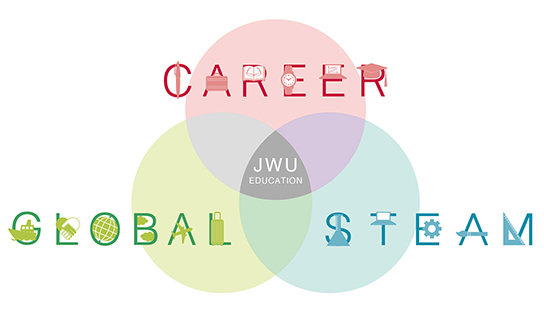- Diploma Policy (Master's Program)
- Curriculum Policy (Master's Program)
- Admission Policy (Master's Program)
- Diploma Policy (Doctoral Program)
- Curriculum Policy (Doctoral Program)
- Admission Policy (Doctoral Program)
Diploma Policy (Master's Program)
Knowledge and understanding
- Students will have a broad knowledge of matters related to human beings and society, mastery of scientific and objective theories and research methods, and practical skills as a specialist.
Thinking and judgment
- Students will be able to elucidate and judge the laws of human behavior and the structure and function of the mind in light of the increasingly complicated social mechanisms and diversification of human relationships.
Interest, volition, attitude
- Students will be able to properly carry on the traditions of psychology and have the ability to contribute to its development.
Skills and expressions
- Students will have advanced communication skills based on empirical theories and research methods, and mastery of professional techniques in practice. Furthermore, in the clinical field, they will have practical skills appropriate for graduates of a Class 1 Designated Graduate School for Training in Clinical Psychology.
Curriculum Policy (Master's Program)
Knowledge and understanding
- Full-time faculty members provide seminars and lectures in their own fields of specialization. For fields other than those taught by them, part-time lecturers provide seminars and lectures.
Thinking and judgment
- The “Research Methods and Problems in Psychology” is offered for students to acquire the advanced ability to set problems, think and make judgments from a psychological perspective. In the clinical area, seminars and practical training subjects are offered for students to acquire practical thinking and judgment skills as a clinician.
Interest, volition, attitude
- The “Research Methods and Problems in Psychology” is offered, enabling students to learn about the problem awareness and research topics of graduate students in other fields.
Skills and expressions
- The “Research for Master’s Degree” is offered for students to acquire the skills necessary for research. In the clinical area, seminars and practical training subjects are offered for students to acquire the necessary practical skills.
Other
- The “Research Methods and Problems in Psychology” is offered to involve all faculty members with each graduate student and to share information among graduate students.
Admission Policy (Master's Program)
Knowledge and understanding
- Students who have knowledge and understanding of psychology at the level of an undergraduate degree and have sufficient language skills to read through English literature related to psychology.
Thinking and judgment
- Students who have psychological thinking and judgment skills at the level of an undergraduate degree; in the clinical area, students who have thinking and judgment skills as a clinician.
Interest, volition, attitude
- Students who properly carry on the traditions of psychology and have the ability to engage in problems in various areas of human affairs from a psychological perspective.
Skills and expressions
- Students who have basic skills and communication capabilities at the level of an undergraduate degree in setting up a problem and developing a research design for the research.
Diploma Policy (Doctoral Program)
Knowledge and understanding
- Students will have in-depth academic knowledge and skills sufficient to earn their doctoral degree in a specialized field.
Thinking and judgment
- Students will be able to elucidate and judge the laws of human behavior and the structure and function of the mind in light of the increasingly complicated social mechanisms and diversification of human relationships.
Interest, volition, attitude
- Students will be able to properly carry on the traditions of psychology and have advanced ability to contribute to its development.
Skills and expressions
- Students will have advanced professional communication skills based on empirical theories and research methods, and mastery of professional techniques in practice.
Curriculum Policy (Doctoral Program)
Knowledge and understanding
- Full-time faculty members provide seminars and lectures in their own fields of specialization and individual research guidance. For fields other than those taught by them, part-time lecturers provide seminars and lectures and individual research guidance.
Thinking and judgment
- The “Research Methods and Problems in Psychology” is offered for students to acquire the advanced ability to set problems, think and make judgments from a psychological perspective. Individual research guidance is also offered.
Interest, volition, attitude
- The “Research Methods and Problems in Psychology” is offered, enabling students to learn about the problem awareness and research topics of graduate students in other fields. Individual research guidance is also offered.
Skills and expressions
- The “Research for Doctor’s Degree” is offered for students to acquire the skills necessary for research. Individual research guidance is also offered.
Other
- The “Research Methods and Problems in Psychology” is offered to involve all faculty members with each graduate student and to share information among graduate students.
Admission Policy (Doctoral Program)
Knowledge and understanding
- Students who have the knowledge and understanding of psychology necessary to conduct advanced research at the level of Master’s degree.
Thinking and judgment
- Students who have psychological thinking and judgment skills at the level of Master's degree.
Interest, volition, attitude
- Students who properly carry on the traditions of psychology and have the ability to engage in problems in various fields of human affairs from a psychological perspective at the level of Master’s degree.
Skills and expressions
- Students who have gained the expression of skills at the level of Master’s degree and have the advanced skills and communication capabilities required for research in the doctoral program.

